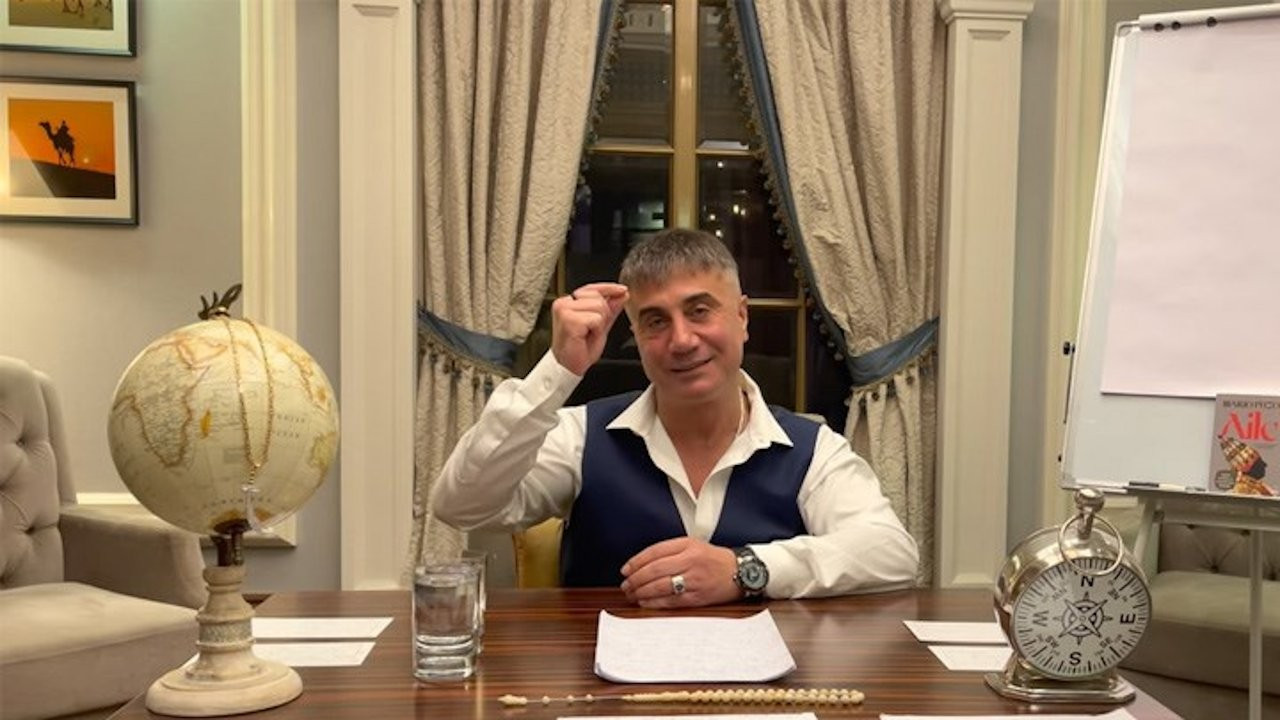Mafia leader discloses Turkish company involved in Syrian oil trade
Turkish mafia leader Sedat Peker, a friend-turned-foe of Erdoğan's government, disclosed the procedures in place to do business in Syria, laid out the hierarchy of the individuals and companies involved. Turkish journalists and citizens in the opposition ranks should be thankful to finally have a name for the Turkish company which brought oil into Idlib: MT Group.
A significant portion of the revelations from Sedat Peker’s last video on May 30, was related to commercial activities in Syria. We are talking millions of dollars in big business profits. He listed “crude oil, tea, sugar, aluminum, copper, used cars,” among others.
In the video, Peker describes a kind of ‘procedure’ to do business in Syria. All the of those people who were named for their involvement have, of course, denied the allegations. As they are unlikely to say “Yes, that is true,” we can say the score is tied. So, if we can’t get reliable firsthand information, we should start to dig around.
The hierarchical procedure described by Sedat Peker is as follows: If you are after doing business in Syria, you first must apply to Metin Kıratlı, the Head of the Directorate of Administrative Affairs of the President of Turkey. If he agrees, he sends you to Murat Sancak-Ramazan Öztürk, that is, the MT Group of Companies. Peker says, “The whole hierarchy is there.” If you get the approval of these two, then you must contact Abu Abdurrahman (who, according to Peker, also uses the name Abu Sheyma), the official in charge of commercial affairs of the Tahrir al-Sham (HTS), which is in control of the Idlib province and parts of western Aleppo. “That’s how trade is done now,” said Peker who referred to the Tahrir al-Sham as “Al Nusra,” the name when this group was an al-Qaeda affiliate in the past.
The HTS-controlled Syrian Salvation Government is the body that carries out oversees work like the import of crude oil and its processing in small and large refineries, wholesale to traders and gas stations, and retail sales and distribution of natural gas to homes in the city of Idlib, the rural parts of the province of Idlib, and in western Aleppo which HTS-controlled. Since 2018, these businesses have been run by a monopoly, Watad, a company, which HTS-founded. Another company, the Kaf company, which was founded in 2019, operates the face-to-face part of the business and interacts with consumers. An observer told Ahmed Ibrahim from the Syria Files, that Kaf worked with Watad but that HTS wanted to create a civilian free market and founded it with this intention. The Shahba, which was founded in December 2020, is another company founded with the same intention. Ali Darwish’s article in Enab Baladi reveals the link between these three companies, although they try to appear as if they are competing. The article also claims that Ankara “did not authorize oil imports transiting from other countries” in the HTS region.
The main route for oil imports into the HTS-controlled Syrian territory is as follows: Turkish companies transport Ukrainian oil to the Port of Mersin, which is then transported by tanker trucks to the Syrian border. Then the oil is transferred to Watad’s tanker trucks at the Bab al-Hawa (across Cilvegözü) border crossing or at the tanker parks on the Syrian side. The ‘tax’ which is paid to HTS per tanker truck as the oil leaves Bab al-Hawa and enters Syria was 400 dollars in mid-2018.
Apparently, Watad determines the price of the oil it sells to dealers and gas station owners. Allegedly, MT Group is the only dealer in Turkey selling oil to the entire region that is held by Syrian armed opposition-jihadist organizations. Thus, the MT Group has the final say.
Abdullah al-Dak, the owner of al-Salam gas stations, told Enab Baladi, that “in case the Syrian merchant needs to import fuel, he should contact one of the Turkish supplier company’s representatives and pay a deposit of five dollars for each ton of fuel to one of the representatives, who transfers the cargo to the merchant in Syria.” When the goods arrive, the Syrian businessman pays the necessary customs duties as well as the organization’s share, and then the oil is transferred to the Syrian side where he picks it up.
Here we see that no official authority or corporation of the Republic of Turkey is included in this mechanism. As it is often mentioned, once again, a national duty is fulfilled by the MT Group.
Efforts to find the Turkish company
An interesting detail I’ve come across is that, the opposition news website, Enab Baladi, has put a lot of effort into finding the name of the interlocutor in Turkey. Watad’s and Kaf’s people didn’t want to give up the company’s name. Ali Darwish, Nureddin Ramadan and Zainab Masri, who investigated the oil sector in northern Syria and wanted to find out who controls it, wrote in 2020 that, in order to reach the name of the MT Group, they had to “resort to various sources, gas station owners, and traders.” They complained, “but still couldn’t find detailed information even when we were looking for the company’s location in Turkey.” Ahmed Ibrahim of Syria Files wrote that the interlocutor on the Turkish side was “a company called MT” according to his “well-informed source.”
The MT Group of course has a website with addresses, phone numbers, and necessary information. The website probably existed when the journalists wrote their article because the MT Group was founded in 2005. Then, why couldn’t the Syrian journalists obtain information from the company website? Because the information they wanted was not there.
Vecih Cüzdan provided information about the MT Group on Sendika.org and, judging by the activities listed in the group’s website, it’s difficult to find any link to any oil purchase. The holding company, which was founded by Murat Sancak, a Turkish businessman, describes itself as, “having a total of nine companies and approximately 300 employees who work in various sectors.” However, it says its “main field of activity is technology, health and next generation payment systems.” There are five companies with linked logos on the company website, the addresses and numbers of four of them are included in the website’s contact section.
MT Technologies and MT System are listed as ‘Vera companies’ on the website of Vera Sales and Payment Systems. When you click on their links, a small explanation window pops up in one and a window with the logo in the other. When you click on their links on the MT Group’s home website, you’re redirected back to the Vera Sales and Payment Systems website.
MT Health Products has been in operation since the group’s establishment in August 2005. The company introduces itself as a “company that has brought mobility and quality to the health sector since day one.” Blood glucose meter, diapers, lemon cologne sprays, insulin shot pens, air beds, and sick beds are among the products this company sells. Another company affiliated with the group is Metuas Medikal, which sells a type of a modern patch.
Vecih Cüzdan reviewed the Trade Registry gazette and pointed to the fact that the group “was established to operate in a very wide field.” This ‘large field’ probably includes Syrian territory controlled by the Turkish Armed Forces, the Salvation Government (HTS), or the Provisional Government that controls the area to the west of Aleppo, if Sedat Peker’s story is true. There’s no trace of any activity in Syria anywhere in the holding company’s website.
Peker also claimed that the MT Group completely dominated all the trade -- including everything other oil -- from Turkey to the regions outside the state control of Syria. But we don’t have any means to verify this. As you can see, the oil and other fuels trade monopoly, which has been confirmed by one side, cannot be confirmed by the other because there is little to no information about it.
The chairman’s message
If we read the ‘Chairman’s Message’ on the MT Group’s website, we learn about ‘national duties.’ The political message of MT Group Chairman Murat Sancak starts with “Valuable Associates…” just like the Sedat Peker videos. It is up to us whether we consider this as a joke or an unfortunate coincidence.
“Those who want to disrupt the peace and stability of our country have been doing their best for a long time,” the address begins. He then reminds us of the “February 7 National Intelligence Organization (MİT) crisis, parallel plot, the uprising by manipulating the feelings of our youth (Gezi Park incidents), and the period that led to the coup attempt.” He wrote that the same atrocious centers “tried to create chaos in the country, weaken the government” and finally take over the state. He has sadly watched “these treacherous efforts” followed by the leaking of state secrets, which was the story of the MİT trucks. It did not stop there, and the country has seen “the greatest betrayal of all times” on July 15, 2016, the coup attempt. While our state has been struggling to overcome these events, his companies have been working on projects on a scale not seen in the history of the Republic.
However, this group did have to face “economic games this time” while they were in the process of “creating a more prosperous country.” Sancak points out the “deceitful actions of credit rating agencies.” He suggested that these agencies have caused our currency to lose 17 percent of its value. He also wrote “These problems and attacks, which we are now sure were created artificially, are aimed at the survival of our country.”
Then comes the Syria issue: “The Western world first stirred up Syria with the Greater Middle East Initiative, which meant the shedding the blood of countless Muslims, then they targeted our country with the coup attempt. If they had succeeded, it would have been our turn after Syria. For this reason, we need to be aware of the games that are playing in our country. Otherwise, thanks to a leader like R. Tayyip Erdoğan, we will not be as lucky as the Syrians who have been protected by him; we will not find any country with a door to knock on.”
The chairman’s message ends with a ‘request’ from all of us “as Turkish citizens who love their country and their flag.” According to Sancak, in order to spoil those games being played in our country and the Islamic world, “We need to support Mr. Recep Tayyip Erdoğan and the ‘People’s Alliance,’ in short, the future of our state together, not only with our own votes, but also by enlightening those around us.”
Murat Sancak has denied Sedat Peker’s claims, saying that he has not even “traded a matchstick in Syria.” He then thanked God that he was “not like that.”
Journalists and citizen journalists in the opposition ranks must be thankful that they finally found, after a lot of effort, the name of the Turkish company that brought the oil into Idlib. The name they have found is MT Group.
In this case, we can consider the score of the match to be 2-1 against Murat Sancak.


 Turkish mafia leader claims Erdoğan's 'parallel army' sent weapons to al-Nusra in SyriaDiplomacy
Turkish mafia leader claims Erdoğan's 'parallel army' sent weapons to al-Nusra in SyriaDiplomacy